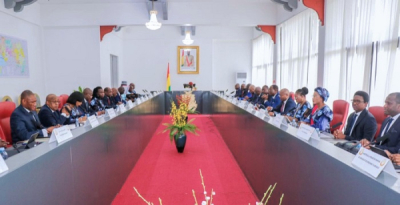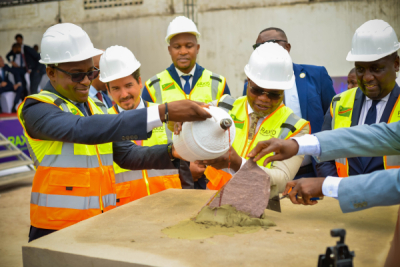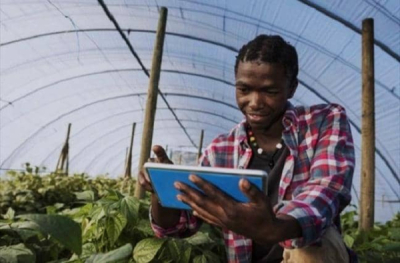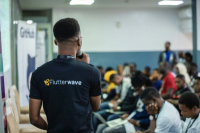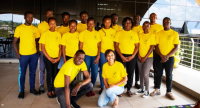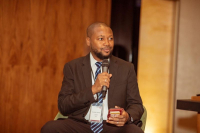Google and the IFC estimate that the digital economy could generate $180 billion for the African economy by 2025. However, many countries could miss out on this opportunity because of their lagging digital transformation. These countries are trying to avoid such outcomes with bilateral cooperation.
Cabo Verde’s Secretary of State for Innovation, Pédro Fernándes Lopes (photo, left), and the Ivorian Minister of Digital Economy Amadou Coulibaly (photo, right) discussed bilateral digital cooperation last September 15, in Abidjan.
According to Amadou Coulibaly, Côte d’Ivoire has so much to learn from Cabo Verde, which is among the African countries with the highest e-government development index. As the eighth best African country in that index (per recent UN figures), Cabo Verde performs well in the online services, telecommunications infrastructure, and human capital segments.
Pédro Fernándes Lopes stressed that Côte d'Ivoire can bring a lot to Cabo Verde. "We are certainly a small country, but we have great goals. We think that Côte d’Ivoire is a strong partner, which can help us achieve those goals,” he said. The State secretary also invited the Ivorian Minister of Digital Economy to visit the Cabo Verde Technology Park, an AfDB-funded digital entrepreneurship and innovation support infrastructure that is expected to be completed by the end of 2022.
In its 12th edition of the Côte d’Ivoire economic update, the World Bank forecasts that the digital sector could contribute more than $20 billion, or 10% of the GDP to Côte d’Ivoire’s economy. The sector has already created 3,000 direct jobs and contributed $5.5 billion (3% of GDP) to the country’s economy.
Samira Njoya
After raising $600,000 in April to support its growth, Malagasy edtech Sayna is partnering with Orange, one of its investors, to reach its flagship goal of training 8,000 developers by 2024.
Orange Madagascar and Malagasy edtech platform Sayna signed, Wednesday (September 14), two partnership agreements to offer tech digital skills to young Malagasies. The agreements were signed by Frederic Debord (photo, left), CEO of Orange Madagascar, and Matina Razafimahefa (photo, right), one of Sayna's co-founders. Under the agreements, Orange will deploy Sayna licenses, enabling access to the platform’s online courses for its learners’ network.
The two parties explain that "with Sayna's 100% online and gamified training, Orange is extending its impact, as far as digital inclusion and prompting equal opportunities are concerned, to the entire country.”
They add that thanks to the two agreements, Orange Digital Center Madagascar has become a partner space that will host in-person sessions and events organized by Sayna in Malagasy provinces.
Sayna was founded in 2018. By using cutting-edge techniques, it introduces young people to digital professions. It also takes care of their professional integration and assigns various business tasks to trainees, depending on their levels. Its teaching techniques earned the trust of many investors, including Orange Ventures.
The agreement between Orange and Sayna will enable access to the ed tech professional integration feature for the young people trained at the Orange Digital Center. “With the tasks assigned by Sayna to Orange Coding Academy learners, the latter will get paid professional experience that gives them hands-on training while awaiting their first jobs,” the two parties indicate.
Adoni Conrad Quenum
According to the World Bank, digital identification is an essential tool in the acquisition and efficient management of data useful for the implementation of public policies. In many African countries, however, the implementation of that project is still hindered because there is no implementation strategy.
In the Republic of Guinea, Prime Minister Bernard Goumou recently asked public and private actors to submit proposals for a legal and technical framework overseeing the unique id project. During the September 15, 2022, ministerial council, he explained the importance of the project to the country’s digital transformation efforts and the need to guarantee a certain number of prerequisites for its success.
According to Bernard Goumou, many departments already have functional biometric systems. This is currently reflected in the establishment of civil status documents, passports, residence permits, and driving licenses, the register of the National Agency for Economic and Social Inclusion (ANIES), and the WURI (Unique Identification for Regional Integration and Inclusion in West Africa) base register. However, those systems are fragmented with no interconnection. In addition, some systems cover just parts of the residents.
The Prime Minister also justified the need for the legal and technical framework with the quality of the services, the decentralized nature of the systems and the hosting infrastructures as well as the need for personal data protection.
Given the urgency of the unique identifier project, which should help improve public governance and access to public services, the Prime Minister urged public and private actors to submit the proposals for validation within two weeks.
He also suggested the government commission in charge of the project should validate and transmit the framework, the budget, and the draft decree to the President of the Republic as soon as possible.
Muriel Edjo
Thanks to the coronavirus pandemic, the African data center exploded with increased demand for managed services amid an accelerated digital transformation. Raxio wants to capitalize on the growth prospects.
Carrier-neutral data center operator Raxio Group held the groundbreaking ceremony of its DR Congo-based Tier 3 neutral colocation data center yesterday. The data center, which is said to be the first of its kind in the country, was announced in March 2021.
For Raxio Group president Robert Mullins, “access to data center infrastructure is more important now than ever before as connectivity and digital transformation make rapid progress in the DRC.”
“As with all our facilities, our customers and partners have been at the heart of our design process and it is our aim that the DRC’s first Tier III carrier-neutral data center will provide a critical and missing part of the country’s digital infrastructure,” he added.
The infrastructure is expected to be inaugurated in late 2023. It is designed as a state-of-the-art facility with a planned IT capacity of 1.5MW that can accommodate nearly 400 racks. It is expected to improve the traffic between local and international content creators, but also enhance Internet connection and make it more affordable for users.
For DRC officials, the data center under construction aligns with the government’s strategic plan to equip the country with digital infrastructures of international standards, as reflected in the national digital plan horizon 2025.
According to the report "Data Center Market in Africa - Industry Outlook and Forecast 2020-2025", the data center market in Africa is expected to grow by over 12% annually in 2020-2025. Its value is also expected to rise to US$3 billion. Raxio wants to take advantage of this burgeoning market by building 10 to 12 data centers across Africa. Currently, it has data centers in Uganda, Ethiopia, Mozambique, Ivory Coast, and Tanzania.
Samira Njoya
As she explains, she entered the agritech sector to help farmers improve their income. The choice proves sound as she is now a multiple award winner thanks to her ventures.
Anaporka Adazabra (photo) is a Ghanaian tech entrepreneur and the CEO and co-founder of agritech company Farmio Limited. Her agritech company, launched in July 2019, provides digital solutions for greenhouse farming. Thanks to its farm management software, it provides users with real-time access to agronomic information essential for crop selection and planning.
The software also assists in resources, operations, and finance management. Thanks to its Greenhouse Automation Kit, Farmio Limited also enables farmers to remotely monitor their greenhouses and crops. It also provides an online marketplace for its clients to sell their crops.
For Adazabra, who also offers greenhouse farming training, the aim is to "help new and existing greenhouse farmers improve their production and income."
She launched Farmio Limited a few months before taking on the role of business development manager at Inkeit Innovation, an IT company she co-founded in 2019. The said company specializes in website and software development, and language (French and German) teaching.
Before embarking on her entrepreneurial journey, Anaporka Adazabra worked at Dansyn Innovation Social Organization's web technology and social media office between 2018 and 2021. Thanks to her entrepreneurial ventures, she won the 2022 Best Female Entrepreneur Award at the TotalEnergies Startupper of the Year Challenge. She is also a finalist for the Best Women-Led Agribusiness Award at the AgriHack Pitch sponsored by the Africa Green Revolution Forum (AGRF) and Heifer International.
Melchior Koba
One year after the first edition of the YouthADAPT Challenge, which rewarded twenty African start-ups, the two partners are again calling on young people to submit innovative solutions and business ideas that can help adapt and build resilience to climate change.
The Global Centre for Adaptation in partnership with the African Development Bank (AfDB) launched, on Wednesday 15 September, the second edition of the Youth Adaptation Solutions Challenge (YouthADAPT Challenge) on climate change adaptation.
The call is open, till, October 4, 2022, to young entrepreneurs aged 18 to 35, micro, small and medium enterprises (MSMEs) as well as other youth-led or youth-owned companies in Africa (50% female-led).
To be eligible, start-ups must be based or legally registered in Africa. They must also provide climate adaptation or resilience solutions that address real-life challenges.
The twenty successful business plans will each receive development grants of up to US$100,000. They will also benefit from a 12-month business acceleration program to help them scale up their businesses and create decent jobs. In addition, dedicated support and mentoring for the winning companies will help them develop partnerships, share knowledge, and learn through a network of young entrepreneurs invested in climate change adaptation.
Since the launch of the eNaira on October 25, 2021, Nigeria has been working to stabilize its weakening currency, curb the rising inflation and boost growth after the economic disruption caused by the Covid-19 pandemic.
Nigerian company Flutterwave announced on Wednesday, September 14 that merchants will now be able to accept eNaira payments from their customers on their platform. The new payment option adds to the existing ones, including bank cards and transfers, barter payments, etc.
In its product update published the same day, the company explains that the move aligns with its commitment to providing the “best payment experience for businesses everywhere.”
“The eNaira joins the robust list of payment options available on Flutterwave. Merchants can now enable the eNaira payment option for collection from their customers via API and Checkout,” it wrote.
The latest information from the Nigerian Central Bank (CBN) revealed that about 270,000 eNaira wallets have been opened, of which 252,000 are consumer wallets and 17,000 are merchant wallets. In addition, the volume and value of transactions have reached over NGN200,000 naira (US$467.5) and 4 billion respectively.
To transact in eNaira on Flutterwave, users will now need to either scan QR codes or generate unique tokens using the app.
Through its platform, Flutterwave provides technology, infrastructure, and services to enable global businesses, payment service providers, and pan-African banks to accept and process payments on any channel (Web, Mobile, ATM & POS). The company which currently operates in Africa, Europe, North America, and other emerging markets provides a suite of payment tools that enable over one million businesses to accept payments from their customers worldwide in over 150 currencies, including Naira and now eNaira.
With this move, Flutterwave eases the implementation of Nigeria’s economic strategy to boost the use of its digital currency by attracting even more unbanked users including merchants “after a first phase adoption saw 850,000 downloads by bank customers.”
Samira Njoya
African tech entrepreneurs are developing solutions to ease daily business tasks. In Kenya, a fintech solution has been developed to help merchants operating in the informal sector with their bookkeeping tasks.
Leja is a fintech solution developed by Kenyan startup Asilimia. It allows merchants operating in the informal sector to record their cash inflows and outflows.
“I use it to write down my statements. Sometimes my supplier calls me to find out how much products he sold me two or three weeks ago. Thanks to Asilimia, it's easy, I go to the app and I find the transaction. [...] Before, I had to write everything down in a notebook, but it's easy to lose it. While these readings are important, it allows me to see at the end of each month whether I am selling at a loss or making a profit,” indicated Judy Achieng, a Leja user.
The solution has an Android app that allows merchants to record their transactions. Leja integrates M-Pesa, the popular mobile money wallet in Kenya. Asilimia also plans to add other mobile money providers as well as banks to enable merchants to collect payments.
To use the Leja app, merchants must create an account by filling some personal information. The process is crucial because merchants can access microloans through Leja as microfinance institutions and banks can monitor the evolution of users’ businesses.
In Kenya, Asilimia claims more than 50,000 people are using Leja. It also plans to roll out a USSD Code to enable access to its services for rural populations.
Its services cost US$3.5 monthly. Since its creation in 2017, it has raised nearly US$2.5 million to support its development. This year, it is one of the startups selected for the second cohort of the Google for Startups Black Founders Fund for Africa.
Adoni Conrad Quenum
With over 10 years of digital transformation consulting experience, his mission is to contribute to the emergence of innovative and impactful entrepreneurs who will support socioeconomic development in Niger.
Maman Rouffahi Koabo (photo) is a Nigerien entrepreneur and computer network and systems engineer. He leads, since July 2018, the SME Incubator Centre of Niger (CIPMEN). The incubator was founded in 2013, as the result of a public-private partnership. Currently, it claims some 222 high socioeconomic impact businesses incubated and more than 7,900 people trained.
Under his leadership, in 2020, CIPMEN launched the Smart Villages for rural growth and digital inclusion project, which aims to connect 15,000 villages to digital tools and public administrations for easy access to electronic services. Also, in 2022, the incubator set offices in Dosso, expanding its national presence to seven administrative regions out of eight in the country.
In addition to his duties as the CEO of CIPMEN, Maman is also the CEO of French tech company Kinnov Sarl, since 2017. He began his professional career, in 2009, working as an infrastructure migration consultant for Safran, an international high-tech group that operates in the aerospace and defense sectors. He later joined tech company Exakis as an infrastructure consultant. In 2013 he was hired by RTE (Réseau de transport d'électricité) as an IT project manager.
In 2017, Indosuez Wealth Management appointed him as a technical architect and project manager. In parallel, he was already managing Kinnov Sarl. He then did five months (April to August 2018) at AXA as a DLP & RGPD cyber security consultant.
Melchior Koba
The deal comes a few months after HotelOnline closed its Series A round. The round was backed by Yanolja, a South Korean travel tech, which was then making its first commitment in Africa.
Kenyan travel tech company HotelOnline announced, Tuesday (September 12), the acquisition of hospitality software company HotelPlus.
Although the terms of the acquisition were not disclosed, Eric Muliro, the founder of HotelPlus said he is receiving a US$1.9 million payment in HotelOnline stock, which was valued at US$24 million prior to the deal. At the same time, he has been named HotelOnline's chief technology officer.
The deal will allow HotelOnline to significantly increase its customer base while "capitalizing on the combined strengths of both companies, creating a force to reckon with in East Africa’s hospitality industry[...] Because the HotelPlus client-base currently uses on-premise software, this creates a unique integration opportunity with our cloud solutions," said HotelOnline co-founder Havar Bauck.
In its May 2022 report, consulting firm W Hospitality Group indicates that 14,538 hotel rooms were created in East Africa in 2021. The number was up by five percent from 13,837 in 2020, placing the region in the second position in sub-Saharan Africa behind West Africa.
HotelOnline wants to leverage this acquisition to become a strong African travel-tech player with a local and continental footprint in a continent where it already has over 6,000 customers across 27 countries. Its immediate plan is to conquer East Africa first, then Nigeria and Senegal. To fulfill that plan, it can rely on the expertise of its new chief technology officer, Eric Muliro, who founded HotelPlus in Kenya 13 years ago.
HotelOnline was launched in 2014. It helps hotels establish and increase their online visibility, deploy booking engines and gain exposure on distribution channels such as Booking.com. The deal with HotelPlus increases its client base by more than 2,200 and opens doors to additional customers, and unique offerings such as payment solutions, AI-driven pricing, and revenue management.
Samira Njoya
More...
The partnership between the two companies addresses several issues, including transparency problems. It also helps avoid the long bank queues.
Orange Money and pan-African payment company Cellulant recently partnered to launch card-to-wallet transfers for eight banks in Botswana.
According to a release published by Cellulant last Monday, the solution baptized Orange Money Card-To-Wallet will positively impact growth in the informal and financial services sectors.
“The introduction of Card-To-Wallet aligns with our financial inclusion strategy that is centered around providing relevant and convenient solutions that address our customers’ everyday needs, as well as addressing our priorities around placing our customers first,” said Seabelo Pilane, CEO of Orange Money Botswana.
For Bathusi Beleme, Cellulant's Country Manager in Botswana, the partnership is in line with the payment company’s strategy to extend its services to “merchants in Botswana to help them digitize their payments.”
The service is already accessible to banked Orange Botswana subscribers. It will allow them to transfer funds from their bank cards to Orange Money wallets via Orange Botswana’s website. The process is powered by Tingg, Cellulant's payment platform.
The sender will need only a registered Orange SIM card while the recipient will need an Orange Money account. Although most banks in Botswana have mobile apps, some do not yet offer this option to their customers. This solution, therefore, offers bank customers more options and allows them to transfer money easily and transparently, saving a lot of time.
In its 2021 report, "The State of Instant Payments in Africa: Progress and Prospects," independent organization AfricaNenda says that, in Africa, 27.5 billion transactions were made by mobile payment accounts in 2020. The overall transaction value was US$495 billion. Year-on-year, the transaction number rose by 15% while the value increased by 23%.
Samira Njoya
His ambition has always been to contribute to financial inclusion in Africa. After his stint at the online betting and gaming company 1960bet, he embarked on an entrepreneurship journey, becoming the co-founder of two fintech companies.
Kingsley Nwose (photo) is a Nigerian economist and entrepreneur. In August 2020, he co-founded fintech platform Joovlin with Yusuf Olalere and Lucky Mark, two fellow students he met during his time at the Meltwater Entrepreneurial School of Technology. Through Joovlin, he provides B2B solutions helping businesses manage their stocks and boost sales.
“We noticed that lots of people have started selling on social media – WhatsApp, Instagram, and Facebook. […] Over 90 percent of them do not stock any goods, they only post images of trending products and source them when orders are placed. They walk from store to store picking up the ordered items, and also manually find logistics personnel to deliver the orders. [...],” he told Disrupt Africa in September 2022.
According to the media, “Joovlin decided to work on making this disjointed process more efficient, and early uptake has been strong.” Meanwhile, Kingsley explains that his startup enables “low-budget underserved retailers to sell with zero capital investment.” “We are also providing a direct-to-retailer tool for enterprises. We help them connect directly with their retailers,” he added.
Kingsley holds a degree in database and server administration from the Indian talent development corporation NIIT Pune. In 2015, he got a Master’s in Monetary Economics from the University of Port Harcourt, Nigeria. Two years later, he received an entrepreneurship certificate from Bocconi University, Italy.
The entrepreneur also co-founded Nigerian fintech Bewla in 2017. Currently, he is a Tony Elumelu Foundation and Yali Africa business mentor. He began his professional career, in 2013, as the area manager of Nigerian gambling company 1960bet. After years as the business developer of Bewla, he joined MEST Africa as a product designer and business developer. He co-founded Joovlin after leaving MEST Africa.
In August 2022, he became one of the winners of the Seedstars Migration Entrepreneurship Prize, which rewards socially-driven businesses that “enhance the economic inclusion of migrants in the Middle East and Africa ”
Melchior Koba
He co-built his travel tech Tripesa from the ashes of another startup: Roundbob. The new startup has already earned the trust of several investors.
David Gonahasa (photo) is a Ugandan economist and entrepreneur. He is also the CEO of travel tech Tripesa, which he co-founded in 2021 with Thomas Karugaba and Raymond Byaruhanga.
Tripesa was born out of the ashes of travel booking platform Roundbob during the coronavirus pandemic, which affected the whole world. It offers African SMEs operating in the tourism industry a solution to optimize their operations and improve their profitability.
“Small businesses must be able to package tourism and digitally distribute a splendid tourism experience for it to sell, or else they stand to lose the market to the few bigger players. [...] What Tripesa is doing is leveling the playing field, enabling small operators to leverage technology to escape the market limitations and scale their businesses,” David told TechCabal in August 2022 when Tripesa closed an undisclosed pre-seed round to scale across Africa.
Apart from his passion for the African tourism industry, David Gonahasa is also a wildlife conservation enthusiast. In 2021, he co-founded The Naturalist, a conservation company leveraging technology to protect wildlife resources. Through his conservation company, he launched the Home of the Gorillas project, which aims to create additional revenues to complement the tourist trekking income that remains the main source of financing the Mountain Gorilla conservation.
In 2018, he participated in the Alibaba e-founders fellowship program. A year earlier, he won the Innovator of the Year Prize during the MTN Innovations Awards. David is a seasoned entrepreneur with several ventures under his belt but, he also has an extensive professional career, which started in 2007. That year, after being the business development director of the e-business company Mediaflower Uganda he co-founded, he joined advertising company Creaxion Rwanda as an account director. The following year, he assumed services as a client services manager for the online marketing agency MAAD Advertising. He later joined Real Marketing Uganda, another marketing agency, as its strategic director before assuming office as the chief marketing officer of universal payment platform Mobicash Africa, in 2011. Some years later, he made a brief stint as a senior consultant for business manager SMEHUB.
Melchior Koba
In Africa, access to financial support is often challenging for women entrepreneurs. The situation limits the positive impact they can have on continental growth.
On Monday, September 12, Janngo Capital, an Abidjan-based private equity firm, announced the first close of its fund Janngo Capital Startup Fund (JCSF) at €34 million. The fund is backed by global financial institutions as well as leading private companies.
Its investment strategy will include backing startups that enable Africans to improve their access to essential goods and services and small and medium-sized enterprises on the continent. It will particularly focus on women and the youth.
“We are proud to lead Africa's largest gender-equal tech VC fund and see major global investors rally around our vision to back entrepreneurs building digital champions across Africa," says Fatoumata Bâ (photo), founder and executive chair of Janngo Capital.
According to Janngo's release, “ women in Africa are the most entrepreneurial in the entire world with a total entrepreneurship activity rate of 26%. Yet, they face a $42 billion funding gap and have very limited access to growth capital.”
By dedicating half of the proceeds of JCSF to women-led businesses, Janngo aims to work towards improving equitable access to seed capital for technology entrepreneurs in Africa. The funding to be allocated will range "from EUR 50 000 to EUR 5 million", explains Fatoumata Bâ.
The four-year-old venture capital firm has a particular interest in innovation in French- and English-speaking Africa, in sectors such as health, logistics, financial services, retail, food, agriculture, and mobility.
Janngo Capital claims to have funded 11 startups in Africa, including Sabi, a growing B2B e-commerce platform with a female CEO, and Jexport, an Ivorian online freight marketplace led by a woman, while other startups, such as the fintech Expensya, have male founders.
Samira Njoya




